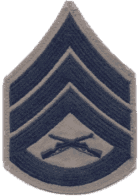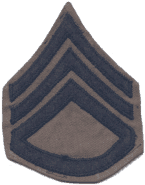Service Uniform



The Service Uniform has been around for quite some time. Currently, Service 'A' consists of a green coat, green trousers, khaki shirt, tie, garrison cap or green service cap and the khaki web belt. According to current uniform regulations, Service 'A' is "normally worn when reporting for duty, unless otherwise prescribed by the commander." The Service uniform is not worn on formal occasions.
Badges and ribbons are worn with this uniform, but never medals of any size. Rank insignia on the Service coat and overcoat are forrest green on a scarlet backing. On the shirts, rank insignia is forrest green on khaki.
Two other versions of the Service Uniform exist, 'B' and 'C'. Service 'B' is the same as 'A' minus the green coat. When Service 'B' is worn, a green 'woolly pully' sweater, adopted from British design, can be worn on top of the shirt. The khaki short sleeve shirt is worn with the green trousers in Service 'C'.
Women currently are allowed to wear either slacks or a skirt with this uniform. It should be noted that females wear a green necktab in lieu of the khaki tie. Females also wear different style service and garrison caps than their male counterparts wear.


The Staff Sergeant's insignia shown on the far right is the current issue. It is worn on both sleeves of the khaki shirts. The other badge is the equivalent insignia from before the 1940s (I haven't determined an exact time period as of yet). The chevrons and arc on the older badge are cut from a green material and sewn on, as opposed the the current chevrons which are embroidered by machine.
A green Service Uniform has been worn by Marines since 1912, but not always under the same name. In the early 1900s, it was a high-collared uniform of a design similar to the current Dress Blues. Called 'Field Dress', this uniform came in two varieties: a heavy olive green version for winter and a lighter khaki version for summer. In the summer only the 'field hat' or 'campaign hat' was worn. In the winter, Marines wore either the field hat or cap. The uniform was used in combat, as well as in the garrison. Another variation of this uniform was trousers with a flannel shirt of the same color.
In 1928, the Corps dropped the high collar of the uniform. From 1928 on, the green Service Uniform has seen few changes. These changes include the abolishment of the Sam Browne (1942) and the change in color of leather items (1963).

At the time of the Spanish-American War, a khaki version of the Service Uniform was adopted to be worn during the summer. The only major changes to this uniform took place in 1942 and 1963. The Sam Browne belt was abolished in 1942 (currently, the Sam Browne is only worn with Blue-White Dress); the color of all Marine Corps leather items changed from brown to black in 1963. The khaki Summer Service Uniform was worn until 1976.
From 1976 until recently, heavy winter and lighter summer versions of the uniform were worn. Presently, there is only one service uniform, worn year-round.
Female Service Uniforms were a lot more complicated than male versions. It seems that several versions of these uniforms existed. One version of Summer Service was a dress and another version was a skirt and jacket combination, both made of white cotton twil. These white Summer Service Uniforms were, of course, different than the officer's White Dress Uniform. Summer Service Uniforms were worn over the years with white garrison caps, green garrison caps and green service caps. Female Summer Service Uniforms were also changed in color to green.
Winter Service Dress was less complicated. Few changes have been made to it, the largest including the change in the color of leather and the adoption of a necktab to replace the green ascot tie.
Currently, the summer and winter service uniforms differ only in material composition.
This page hosted by ![]() Get your own Free Home Page
Get your own Free Home Page